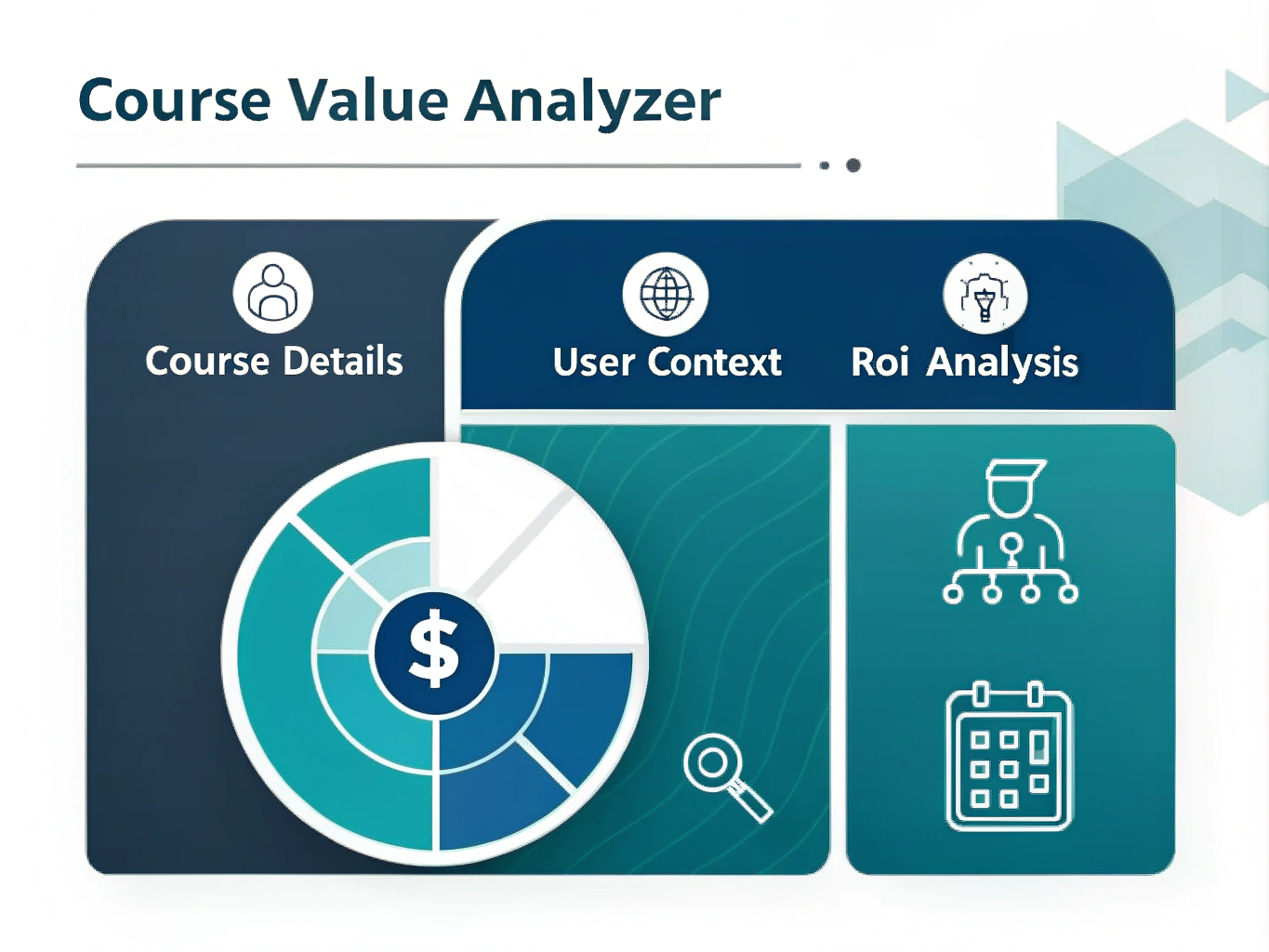Course Decision Analysis
Is this tool helpful?
How to Use the Course Decision Analyzer Effectively
The Course Decision Analyzer is a powerful tool designed to help you make informed decisions about whether to invest in a particular course or educational program. To use this tool effectively, follow these steps:
- Provide Course Details: In the first text area, enter comprehensive information about the course you’re considering. Include details such as:
- Course title and subject matter
- Duration (e.g., number of weeks or months)
- Cost (including any additional fees)
- Course content and learning objectives
- Instructor credentials or institution reputation
- Any certifications or qualifications offered upon completion
Example input: “Data Science Bootcamp, 16 weeks intensive program, $8,000. Covers Python, R, machine learning, and big data analytics. Taught by industry professionals from top tech companies. Includes capstone project and job placement assistance.”
- Provide User Context: In the second text area, enter detailed information about yourself, including:
- Your current educational background and work experience
- Career goals and aspirations
- Current financial situation (income, savings, debts)
- Time availability for studying
- Any relevant skills or knowledge you already possess
Example input: “Recent computer science graduate with internship experience in software development. Aiming to transition into data science role within 2 years. Currently earning $60,000/year as a junior developer, with $10,000 in savings and $20,000 in student loans. Can dedicate 15-20 hours per week to studying.”
- Click “Analyze Course Decision”: Once you’ve entered all the necessary information, click the button to submit your request.
- Review the Analysis: The tool will provide a detailed analysis of whether you should pursue the course, considering factors such as relevance to your goals, potential return on investment, and alternative options.
- Explore Free Alternatives: The analysis will include links to free educational resources that may help you achieve similar learning objectives.
Understanding the Course Decision Analyzer: Your Personal Education Investment Advisor
In today’s rapidly evolving job market, continuous learning and skill development are crucial for career growth and personal fulfillment. However, with the abundance of educational options available, it can be challenging to determine which courses or programs are worth the investment of time and money. This is where the Course Decision Analyzer comes in – your personal education investment advisor.
What is the Course Decision Analyzer?
The Course Decision Analyzer is an advanced AI-powered tool designed to help individuals make informed decisions about their educational investments. By analyzing the details of a specific course and the user’s personal context, this tool provides a comprehensive evaluation of whether pursuing the course is a wise decision.
Purpose and Benefits
The primary purpose of the Course Decision Analyzer is to empower learners with data-driven insights, helping them make educated choices about their professional development. Some key benefits include:
- Objective analysis of course value based on multiple factors
- Personalized recommendations tailored to individual circumstances
- Time and money savings by avoiding unsuitable courses
- Identification of free alternatives to paid courses
- Enhanced decision-making confidence
The Benefits of Using the Course Decision Analyzer
1. Comprehensive Evaluation
The Course Decision Analyzer considers a wide range of factors when evaluating a course, including:
- Relevance to career goals
- Course quality and reputation
- Time commitment required
- Financial implications
- Potential return on investment
- Availability of alternative options
This holistic approach ensures that all crucial aspects are taken into account, providing a well-rounded assessment of the course’s value to you.
2. Personalized Recommendations
By considering your unique background, goals, and circumstances, the Course Decision Analyzer offers tailored advice. This personalization is crucial, as what may be an excellent investment for one person might not be suitable for another due to differences in career aspirations, financial situations, or existing skill sets.
3. Time and Cost Savings
Investing in the wrong course can be costly, both in terms of money and time. The Course Decision Analyzer helps you avoid potential pitfalls by thoroughly evaluating the course’s suitability before you commit. This can save you from spending resources on programs that may not align with your goals or provide sufficient value.
4. Discovery of Free Alternatives
One of the unique features of this tool is its ability to suggest free alternatives to paid courses. This can be particularly valuable if the analysis determines that the paid course may not be the best fit for you, or if your financial situation makes the investment challenging. By providing links to free resources, the tool ensures that you have options to pursue your learning goals regardless of the recommendation.
5. Enhanced Decision Confidence
Making decisions about education and career development can be stressful. The Course Decision Analyzer alleviates this stress by providing a data-driven, objective analysis. This can boost your confidence in your decision, whether it’s to pursue the course or explore other options.
6. Long-term Career Planning
By using the Course Decision Analyzer regularly for different courses and programs you’re considering, you can develop a more strategic approach to your long-term career planning. The tool helps you prioritize which skills and knowledge areas to focus on, aligning your learning journey with your career aspirations.
Addressing User Needs and Solving Specific Problems
The Course Decision Analyzer is designed to address several common challenges faced by individuals considering further education or professional development courses:
1. Information Overload
With countless courses available online and offline, it’s easy to feel overwhelmed. The Course Decision Analyzer cuts through the noise by focusing on the specific course you’re considering and evaluating it against your personal context.
2. Uncertainty About Return on Investment
One of the biggest concerns when considering a course is whether it will provide a good return on investment. The tool addresses this by analyzing factors such as:
- Potential salary increase
- Career advancement opportunities
- Skill relevance in the job market
For example, if you’re considering a $5,000 data science course and your current salary is $60,000, the tool might analyze industry trends and job market data to estimate potential salary increases. If the analysis shows that data scientists with similar backgrounds earn an average of $85,000, it might calculate:
$$ \text{Potential ROI} = \frac{\text{Potential Salary Increase}}{\text{Course Cost}} \times 100\% $$$$ \text{Potential ROI} = \frac{(85,000 – 60,000)}{5,000} \times 100\% = 500\% $$This high ROI could be a strong argument in favor of taking the course, assuming other factors align as well.
3. Time Management Concerns
Many individuals struggle to balance work, personal life, and additional education. The Course Decision Analyzer takes into account your available time for studying and compares it with the course requirements. It might suggest alternative learning formats or pacing if the time commitment seems challenging.
4. Financial Constraints
The tool considers your current financial situation when making recommendations. It might calculate what percentage of your annual income or savings the course represents:
$$ \text{Course Cost as % of Annual Income} = \frac{\text{Course Cost}}{\text{Annual Income}} \times 100\% $$For instance, if you’re considering a $3,000 course and your annual income is $50,000:
$$ \text{Course Cost as % of Annual Income} = \frac{3,000}{50,000} \times 100\% = 6\% $$The tool would then evaluate whether this percentage is reasonable given your financial situation and the potential benefits of the course.
5. Relevance to Career Goals
By analyzing the course content against your stated career goals, the Course Decision Analyzer helps ensure that your educational investments align with your professional aspirations. It might use techniques like keyword matching or skills gap analysis to determine the relevance of the course to your desired career path.
Practical Applications and Use Cases
The Course Decision Analyzer can be valuable in various scenarios. Here are some practical applications:
1. Career Transition
Imagine you’re a marketing professional looking to transition into a data analyst role. You’re considering a 12-week data analytics bootcamp that costs $7,500. The Course Decision Analyzer would evaluate:
- The relevance of the bootcamp’s curriculum to data analyst roles
- Your existing transferable skills from marketing
- The job market demand for data analysts in your area
- The typical salary increase you might expect after completing the bootcamp
- Your financial ability to afford the course and potential ROI
Based on this analysis, it might recommend taking the course if the potential benefits outweigh the costs, or suggest more affordable alternatives if the investment seems too risky.
2. Skill Upgrade for Current Role
Consider a situation where you’re a project manager looking to enhance your skills with a professional certification. You’re eyeing a Project Management Professional (PMP) certification course that costs $2,000 and requires 35 hours of study.
The Course Decision Analyzer would assess:
- The value of PMP certification in your industry
- Your eligibility for the certification based on your experience
- The potential for salary increase or promotion with the certification
- Your ability to commit to the study hours required
- Alternative certifications that might be equally valuable
The tool might then provide a recommendation along with a comparison of different certification options.
3. Continuing Education for Licensed Professionals
For professionals in fields requiring continuing education, such as healthcare or law, the Course Decision Analyzer can be particularly useful. Let’s say you’re a nurse considering a specialized course in wound care management that costs $1,500 and provides 30 continuing education units (CEUs).
The tool would evaluate:
- Whether the CEUs from this course fulfill your license renewal requirements
- The demand for wound care specialists in your area
- Potential for specialization leading to higher pay or better job opportunities
- Cost-effectiveness compared to other CEU options
This analysis helps ensure that your continuing education choices not only meet regulatory requirements but also advance your career goals.
4. Executive Education Decision Making
Executives considering high-cost, prestigious programs can benefit greatly from the Course Decision Analyzer. For instance, if you’re contemplating a $50,000 Executive MBA program, the tool would conduct a thorough analysis of:
- The program’s reputation and alumni network
- Potential for career advancement or pivot to a new industry
- Time commitment required and impact on current work responsibilities
- ROI in terms of potential salary increase and career opportunities
- Comparison with other executive education options or professional development strategies
Given the significant investment, the tool’s comprehensive analysis can be crucial in making an informed decision.
Frequently Asked Questions (FAQ)
Q1: How does the Course Decision Analyzer determine if a course is worth taking?
A1: The analyzer considers multiple factors including the course content, your career goals, financial situation, time availability, and potential return on investment. It uses advanced algorithms to weigh these factors and provide a recommendation based on your specific circumstances.
Q2: Can the Course Decision Analyzer help me choose between multiple courses?
A2: While the tool is designed to analyze one course at a time, you can use it multiple times to compare different courses. This allows you to see detailed analyses for each option and make an informed decision based on the recommendations provided.
Q3: How does the tool find free alternatives to paid courses?
A3: The Course Decision Analyzer searches reputable online learning platforms and educational resources to find free courses or materials that cover similar topics to the paid course you’re considering. These might include MOOCs (Massive Open Online Courses), educational YouTube channels, or open-source learning materials.
Q4: Is the Course Decision Analyzer suitable for all types of courses and educational programs?
A4: Yes, the tool is designed to analyze a wide range of educational offerings, from short online courses to full degree programs. It adapts its analysis based on the type of course and your specific situation.
Q5: How often should I use the Course Decision Analyzer?
A5: It’s recommended to use the tool whenever you’re seriously considering investing in a course or educational program. Additionally, you might want to reassess periodically (e.g., annually) to ensure your educational choices align with your evolving career goals.
Q6: Can the Course Decision Analyzer help me plan my long-term educational path?
A6: While the tool is primarily designed for individual course decisions, using it regularly can help you develop a strategic approach to your long-term educational planning. It can help you identify skill gaps and prioritize learning opportunities that align with your career goals.
Q7: How does the tool account for the quality of online vs. in-person courses?
A7: The Course Decision Analyzer considers factors such as the learning format, instructor credentials, and course reviews when assessing quality. It recognizes that both online and in-person courses can be high-quality, depending on various factors, and takes this into account in its analysis.
Q8: Can the tool help me decide if I should pursue a full degree program?
A8: Yes, the Course Decision Analyzer can evaluate full degree programs. For these more extensive and costly programs, it will conduct a more comprehensive analysis, considering factors such as long-term career impact, opportunity costs, and potential for career change.
Q9: How does the tool stay updated with current job market trends?
A9: The Course Decision Analyzer regularly updates its database with current job market information, industry trends, and skill demands. This ensures that its recommendations reflect the most recent developments in various professional fields.
Q10: Can I use the Course Decision Analyzer for courses in any field or industry?
A10: Yes, the tool is designed to be versatile and can analyze courses across various fields and industries. Whether you’re considering a technical certification, a creative arts workshop, or a business management course, the analyzer can provide valuable insights.
By addressing these common questions, users can gain a deeper understanding of the Course Decision Analyzer’s capabilities and how to leverage it effectively for their educational and career planning needs.
Important Disclaimer
The calculations, results, and content provided by our tools are not guaranteed to be accurate, complete, or reliable. Users are responsible for verifying and interpreting the results. Our content and tools may contain errors, biases, or inconsistencies. We reserve the right to save inputs and outputs from our tools for the purposes of error debugging, bias identification, and performance improvement. External companies providing AI models used in our tools may also save and process data in accordance with their own policies. By using our tools, you consent to this data collection and processing. We reserve the right to limit the usage of our tools based on current usability factors. By using our tools, you acknowledge that you have read, understood, and agreed to this disclaimer. You accept the inherent risks and limitations associated with the use of our tools and services.







